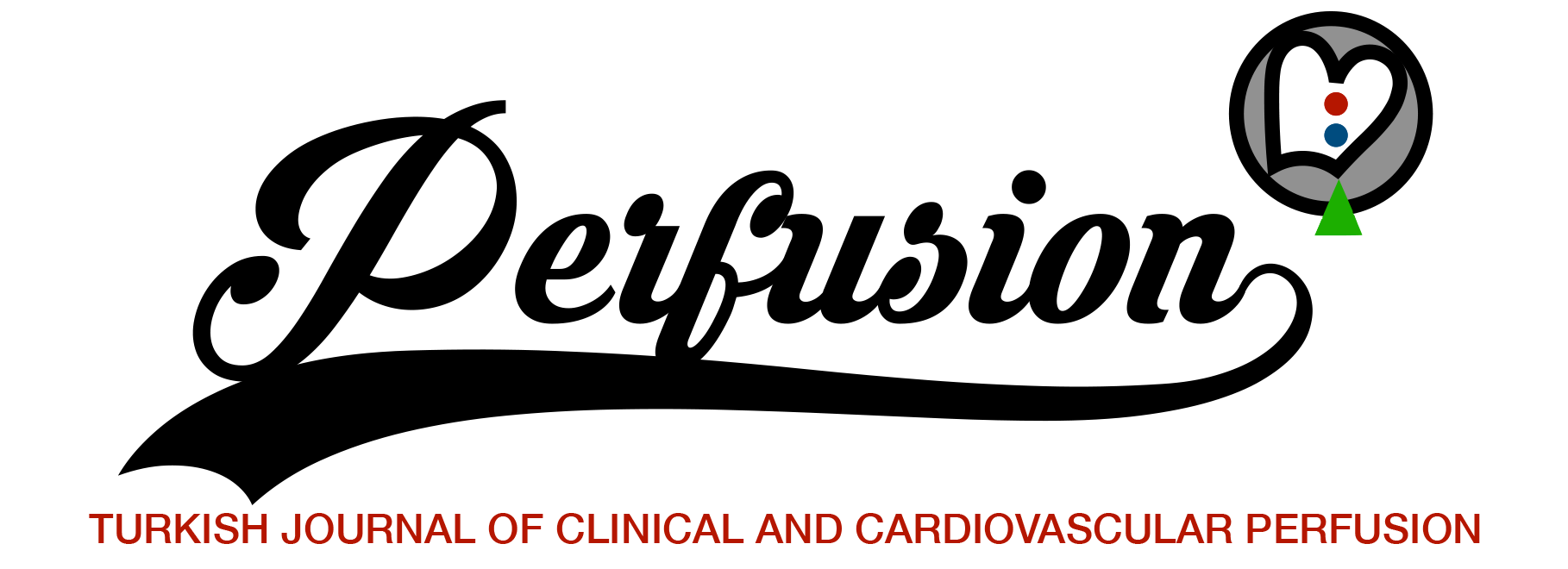ABSTRACT
Objective:
In the first periods of cardiac surgery, blood was added to the prime solution. Balanced electrolyte solutions were started to be used since it was difficult to find blood in long-lasting heart surgery cases. Thus, in hospitals, there was the need for blood a decrease in. It is also easier to prepare the bypass system in emergency cases.
Materials and Methods:
In this study, a total of 40 patients, including 20 patients without methyprednisolone (group A) and 20 patients with methylprednisolone added (group B) to included in the cardiopulmonary bypass (CPB) prime solution. As a parameter of hemogram erythrocyte distribution width-standard deviation (RDW-SD), glucose, lymphocyte, leukocyte, hematocrit (HCT), platelet (PLT), and postoperatively routinely controlled data were compared and evaluated.
Results:
There was no statistically significant difference between lymphocyte, leukocyte, RDW-SD, leukocyte, HCT, PLT values and the stay of intensive care unite, intubation time and drainage amount (p>0.05). Hospital stay in group B cases was shorter than in group A cases (p<0.018). A significant difference was found between the groups in terms of both preoperative and postoperative mean glucose values (p<0.001). Postoperative blood glucose values were found to be higher and statistically significant in group B patients, especially those using methylprednisolone (p<0.001).
Conclusion:
As a result of this study, it was concluded that patients who were applied non-pulsatile flow during CPB had more beneficial effects than patients who did not add methylprednisolone to prime solution.
Keywords:
Open heart surgery, extracorporeal circulation, heart lung machine methylprednisolone, prime solution
References
1Toraman F, Erkek E, Güçlü P, Sayın J, Arıtürk C, Ökten EM. Et al. Near infrared spektroskopisi (NIRS) gerçekten doku saturasyonunu ölçüyor mu?. Acıbadem Üniversitesi Sağlık Bilimleri Dergisi 2013;4(3):115-117.
2Buket S, Engin Ç, Uç H, Ayık MF. Kardiyopulmoner bypass. In:Paç M, eds. Kalp ve damar cerrahisi 2013;2(1):139-172.
3Gürsoy M, Bakuy V, Hatemi AC. Delivering cardioplegia beyond totally occluded native coronary arteries through the saphenous vein bypass vein graft: Is it really a protective tecnique? Koşuyolu Kalp Dergisi 2012;15(3):100-104.
4Chaney MA, Nikolov MP, Blakeman B, Bakhos M, Slogoff S. Pulmonary effects of methylprednisolone in patients undergoing coronary artery bypass grafting and early tracheal extubation. Anesth Analg 1998;87(1):27-33.
5Chaney MA. Corticosteroids and cardiopulmonary bypass: a review of clinical investigations. Chest 2002;121(3):921-931.
6Whitlock RP, Young E, Noora J, Farrokhyar F, Blackall M, Teoh KH. Pulse low dose steroids attenuate post-cardiopulmonary bypass SIRS; SIRS I. J Surg Res 2006;132(2):188-194.
7Morariu AM, Loef BG, Aarts LP, Rietman GW, Rakhorst G, van Oeveren W, et al. Dexamethasone: benefit and prejudice for patients undergoing on-pump coronary artery bypass grafting: a study on myocardial, pulmonary, renal, intestinal, and hepatic injury. Chest 2005;128(4):2677-2687.
8Tassani P, Richter JA, Barankay A, Braun SL, Haehnel C, Spaeth P, et al. Does high-dose methylprednisolone in aprotinin-treated patients attenuate the systemic inflammatory response during coronary artery bypass grafting procedures? J Cardiothorac Vasc Anesth 1999;13(2):165-172.
9Hao X, Han J, Zeng H, Wang H, Li G, Jiang C, et al. The effect of methylprednisolone prophylaxis on inflammatory monocyte subsets and suppressive regulatory T cells of patients undergoing cardiopulmonary bypass. Perfusion 2019;34(5):364-374.
10Paparella D, Parolari A, Rotunno C, Vincent J, Myasoedova V, Guida P, et al. The Effects of Steroids on Coagulation Dysfunction Induced by Cardiopulmonary Bypass: A Steroids in Cardiac Surgery (SIRS) Trial Substudy. Semin Thorac Cardiovasc Surg 2017;29(1):35-44.
11Ebrahimi L, Kheirandish M, Foroughi M. The effect of methylprednisolone treatment on fibrinolysis, thecoagulation system, and blood loss in cardiac surgery. Turk J Med Sci 2016;46(6):1645-1654.



